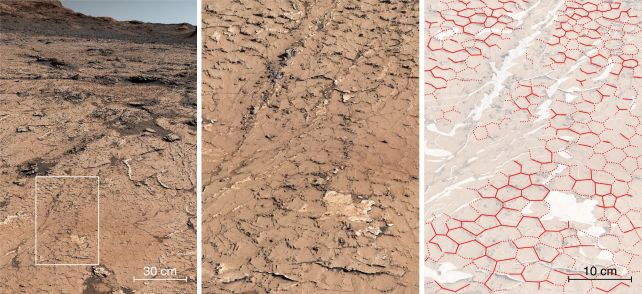It looks like you're using an Ad Blocker.
Please white-list or disable AboveTopSecret.com in your ad-blocking tool.
Thank you.
Some features of ATS will be disabled while you continue to use an ad-blocker.
share:
A team of scientists from Paul Sabatier University in France led by geochemist William Rapin have published a paper in the Nature journal in which
they take a look at hexagonal patterns in sediments pictured by Curiosity rover during its ascent of Mount Sharp in Gale Crater , the patterns
indicate past wet and dry seasons over a prolonged period on Mars and given the existence of already discovered organic molecules on Mars their
findings suggest conditions that were favourable for the emergence of life on the planet.

At this point I think it's becoming increasingly obvious with each new discovery that life did indeed start on Mars and for me as conditions changed at the surface that life followed the water underground where it likely still exists , signalling its existence with the seasonal methane spikes we've detected.

A pattern of hexagons at Gale Crater hints at a history of repeated cycle of wet and dry conditions, allowing minerals to dry out between wet spells to create the specific formations that have since fossilized into rock.
"We observe exhumed centimetric polygonal ridges with sulfate enrichments, joined at Y-junctions, that record cracks formed in fresh mud owing to repeated wet-dry cycles of regular intensity," writes a team led by geochemist William Rapin of Paul Sabatier University in France.
"Instead of sporadic hydrological activity induced by impacts or volcanoes, our findings point to a sustained, cyclic, possibly seasonal, climate on early Mars."
The implications of this go beyond a more Earth-like climate. They add more weight to the pile of evidence that conditions on early Mars were conducive to the emergence of biochemistry – the molecular foundations of life.
Finally, the thickness of the patterned rock suggests that regular wet-dry conditions persisted on Mars for a long time – thousands to perhaps millions of years.
We have, as yet, no evidence of microbial life on Mars, but these cyclic conditions would have been favorable for the organization of organic molecules into complex compounds. We know there are organic molecules on Mars, and that they're likely widespread. Weather cycles are another piece of the habitability puzzle.
"The addition of direct evidence for a series of repeated wet-dry cycles presented here supports the conclusion that conditions in ancient Gale Crater were conducive to prebiotic polymerization processes," the researchers write.
www.sciencealert.com...
At this point I think it's becoming increasingly obvious with each new discovery that life did indeed start on Mars and for me as conditions changed at the surface that life followed the water underground where it likely still exists , signalling its existence with the seasonal methane spikes we've detected.
Interesting but a bit obvious, as we have known for a long time, but watching the change in size of the polar caps, that Mars does have cyclic weather
patterns, so it would be expected that, when Mars had flowing water on its surface that water would also be subject to those weather patters.
It could also Indicate the rover is actually in a desert on earth that has occasional wet seasons.
I wouldn't go that far. We can certainly say conditions for life were favorable from what little we know about abiogenesis, but the problem is we know so little about abiogenisis. For all we know, abiogenisis may only occur on one planet out of 100 where conditions are favorable, or it could occur on 100 planets out of 100, or anywhere in between, we just don't know at this point.
originally posted by: gortex
At this point I think it's becoming increasingly obvious with each new discovery that life did indeed start on Mars and for me as conditions changed at the surface that life followed the water underground where it likely still exists , signalling its existence with the seasonal methane spikes we've detected.
The question of how difficult it is for life to emerge is interesting – not least because it can shed some light on the likelihood of finding life on other planets.
It would be nice if NASA could send a life detecting experiment or several to Mars to see if it does indeed have microbial life, which it very well may have. They already did that with Viking, but the (somewhat disputed) conclusion was negative on the life test.
Curiosity took a picture of the Earth and moon in the sky above it, something that would be impossible to do if it was on Earth.
originally posted by: cooperton
It could also Indicate the rover is actually in a desert on earth that has occasional wet seasons.
Fascinating. Mars is such an interesting planet, so similar to ours.
I personally am at the point where if it does turn out that some form of life exists on Mars underground, it won't actually surprise me. A very "huh, neat" reaction. Would be cool to have confirmation of life on other planets outside of bacterial examples though.
a reply to: cooperton
Which desert would that be? If so someone would've pranked the "Mars" rover team long before now.
At this point I think it's becoming increasingly obvious with each new discovery that life did indeed start on Mars and for me as conditions changed at the surface that life followed the water underground where it likely still exists , signalling its existence with the seasonal methane spikes we've detected.
I personally am at the point where if it does turn out that some form of life exists on Mars underground, it won't actually surprise me. A very "huh, neat" reaction. Would be cool to have confirmation of life on other planets outside of bacterial examples though.
a reply to: cooperton
Which desert would that be? If so someone would've pranked the "Mars" rover team long before now.
Ya better check out the official definition of the word "fossil" .
Makes it sound a "click-bait title" .
Wouldn't the proper term be "geologic " ?
Otherwise , there is plenty of evidence of the existence of a "climate" on Mars .
Long ago , and far away, before Mars lost the "good stuff".
Makes it sound a "click-bait title" .
Wouldn't the proper term be "geologic " ?
Otherwise , there is plenty of evidence of the existence of a "climate" on Mars .
Long ago , and far away, before Mars lost the "good stuff".
originally posted by: Ohanka
Fascinating. Mars is such an interesting planet, so similar to ours.
.
Other than it's a "rocky planet" it's not very similar.
Mars is about half the diameter of Earth, which means its gravity is about 1/3 that of the Earth.
Its atmosphere is 96% carbon dioxide and it's very thin (about 1% that of Earth), which would kill you within a few breaths.
It's extremely cold, around -65 Centigrade. Your fingers would freeze off in a matter of minutes.
Its crust is mostly iron oxide (unlike Earth)
a reply to: Byrd
It heats up in summer, problem is the temp/pressure on Mars is such that water would generally sublimate directly to gas upon melting. However, the temp does rise high enough during Martian summer for liquid water to form. The Chinese found evidence of liquid water at high lats a couple years back, and those RSL (dark streaks that appear on a seasonal basis) may well point to the existence of liquid water.
It heats up in summer, problem is the temp/pressure on Mars is such that water would generally sublimate directly to gas upon melting. However, the temp does rise high enough during Martian summer for liquid water to form. The Chinese found evidence of liquid water at high lats a couple years back, and those RSL (dark streaks that appear on a seasonal basis) may well point to the existence of liquid water.
originally posted by: Missterious
The Chinese found evidence of liquid water at high lats a couple years back, and those RSL (dark streaks that appear on a seasonal basis) may well point to the existence of liquid water.
Did the Chinese found evidence of liquid water or did they find signs that it's possible for liquid water to exist a high latitudes?
As for the dark streaks, it could be a liquid (some say it's darker sand), water or not.
originally posted by: Ohanka
Which desert would that be? If so someone would've pranked the "Mars" rover team long before now.
They got caught before faking it on Devon Island in Northern Canada: ATS Link
Not sure what desert this would be, lots of candidates out there. If someone noted there's indications of water, that makes me think earth and not so much mars
a reply to: cooperton
From your own link!
"On Devon Island, an island that belongs to Canada, the Mars Rovers were tested before they were sent to Mars. Devon Island is a large uninhabited island that has some of the same characteristics as Mars."
Tested. So not caught "faking it".
Jeezus, fella?!!!!
From your own link!
"On Devon Island, an island that belongs to Canada, the Mars Rovers were tested before they were sent to Mars. Devon Island is a large uninhabited island that has some of the same characteristics as Mars."
Tested. So not caught "faking it".
Jeezus, fella?!!!!
originally posted by: Byrd
originally posted by: Ohanka
Fascinating. Mars is such an interesting planet, so similar to ours.
.
Other than it's a "rocky planet" it's not very similar.
Mars is about half the diameter of Earth, which means its gravity is about 1/3 that of the Earth.
Its atmosphere is 96% carbon dioxide and it's very thin (about 1% that of Earth), which would kill you within a few breaths.
It's extremely cold, around -65 Centigrade. Your fingers would freeze off in a matter of minutes.
Its crust is mostly iron oxide (unlike Earth)
Take the challenge!! What're you, some kind of ape?
new topics
-
South Korea declares martial law for first time in 50 years over North Korea threat
Other Current Events: 1 hours ago -
Alien warfare predicted for December 3 2024
Aliens and UFOs: 5 hours ago
top topics
-
Alien warfare predicted for December 3 2024
Aliens and UFOs: 5 hours ago, 11 flags -
Could Biden pardon every illegal alien
Social Issues and Civil Unrest: 16 hours ago, 8 flags -
Statements of Intent from Incoming Trump Administration Members - 2025 to 2029.
2024 Elections: 14 hours ago, 8 flags -
Stop the Presses! Turkey Soup.
Food and Cooking: 16 hours ago, 5 flags -
South Korea declares martial law for first time in 50 years over North Korea threat
Other Current Events: 1 hours ago, 5 flags
active topics
-
South Korea declares martial law for first time in 50 years over North Korea threat
Other Current Events • 17 • : onestonemonkey -
President-Elect DONALD TRUMP's 2nd-Term Administration Takes Shape.
Political Ideology • 272 • : WeMustCare -
Statements of Intent from Incoming Trump Administration Members - 2025 to 2029.
2024 Elections • 15 • : WeMustCare -
Alien warfare predicted for December 3 2024
Aliens and UFOs • 26 • : WeMustCare -
The Acronym Game .. Pt.4
General Chit Chat • 998 • : tinkerbell99 -
-@TH3WH17ERABB17- -Q- ---TIME TO SHOW THE WORLD--- -Part- --44--
Dissecting Disinformation • 3463 • : duncanagain -
Biden pardons his son Hunter despite previous pledges not to
Mainstream News • 125 • : xuenchen -
Australia passes social media ban for children under 16
Social Issues and Civil Unrest • 28 • : PorkChop96 -
Post A Funny (T&C Friendly) Pic Part IV: The LOL awakens!
General Chit Chat • 7865 • : underpass61 -
Could Biden pardon every illegal alien
Social Issues and Civil Unrest • 22 • : mysterioustranger

